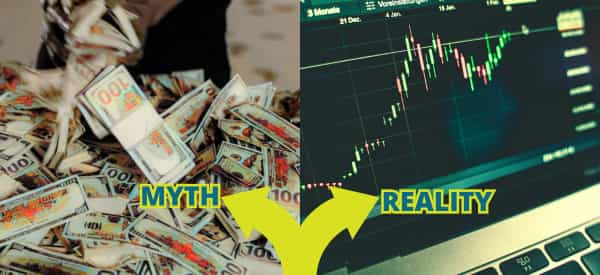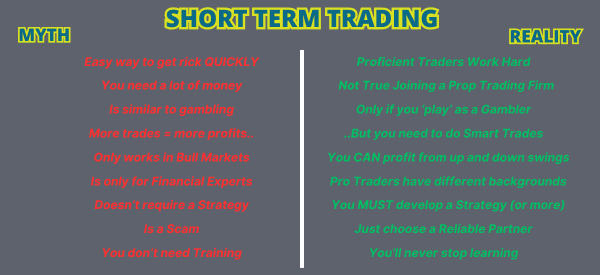Do you believe in unicorns? What about vampires? Or fairies?
Aside from the fabulous roles they play in stories, none of them are real.
And yet, these mythological creatures are incredibly powerful. They capture our attention and money through movies, TV, books, and games. In fact, some people even believe they actually exist…
The reality about short-term trading is that too many people believe the myths that they read on the internet, and never bother to look deeper.
That’s why it’s important that you hear the truth from experts—and not from your cousin who knew a guy who was a short-term trader for a week.
Today, we will tackle nine of the most persistent and wrong-headed myths people repeat about short-term trading.
By the end, you’ll fully grasp the difference between fact and fiction in the global trading industry.
Table of Contents
Short-Term Trading: A Brief Overview
In the broadest sense, there are two ways to go when buying and selling assets such as stocks, commodities, bonds, EFTs, crypto, and foreign currency.
We characterize these two groups as traders and investors.
The difference is that investors allocate capital for the long term, based on the intrinsic value of an asset. Conversely, traders work with market volatility to identify short-term opportunities.
You may have heard of “day trading”—a narrow label that gets used broadly and creates confusion. The fact of the matter is that day trading as a label is too narrow to define short-term trading, which covers a variety of trading activities, such as scalping and swing trading.
Short-term trading is built on a set of tools, techniques, and expertise that most long-term investors don’t need. Just like surfers and sailors, everyone is operating in the same ocean. They’re just using different gear and skills.
If you want to learn more about the major historical facts, you can do so by reading our history of short-term trading.
Short-Term Trading: Myth vs. Reality
We wouldn’t be talking about short-term trading myths if some people didn’t spread misinformation about the industry in the first place.
If you’re interested in global markets and curious about a career as a short-term trader, you need to understand the truth behind each of these myths.
At Real Trading, we’re building a community of professional traders who want to make a living as short-term traders. That’s why we’re passionate about setting the record straight.

Myth #1: Short-Term Trading Is an Easy Way To Get Rich Quick
This myth is mainly spread by people who have a vested interest in recruiting amateurs and making money when their trades go south.
However, the promise of making a fast fortune in short-term trading is dangerous and misleading.
If you hear someone preaching about the possibilities of “hitting it big” without also mentioning the required skills and education, keep a close eye on your bank account.
Here’s the truth about how people make money as short-term traders.
They study, train, and hone their trading skills over time. They also work patiently to build a history of successful trades based on planning and risk management.
Professional short-term traders know they’ll lose money, especially early in their careers. They work hard to become proficient traders with significant buying power, which allows them to strike when the market is ripe and take home major profits.
Myth #2: You Need a Lot of Money To Start Short-Term Trading
When you see how wealthy traders can be, it’s easy to assume that you must “have money to make money” as a short-term trader.
This perception is compounded by the fact that some countries, such as the US, have laws governing the net worth of individuals who want to invest in certain assets.
Such laws are usually framed as protections for average citizens who aren’t prepared for the huge losses that investing can cause. That tends to feel like a weak excuse when governments and central banks bail out those same investors when they overleverage on risky deals.
Here’s the truth about working capital for short-term traders.
Just like any business you might launch, you need some money to get started. However, your net worth is not a qualification criterion or predictor of your success.
In fact, if you choose to work with a prop trading firm, you’ll gain access to significant buying power once you’ve earned your certification and proven your ability in a trading simulator.
Myth #3: Short-Term Trading Is Similar To Gambling
Professional traders do indeed talk about probability, risk, bets, and luck, but that’s because global markets don’t follow an immutable law like gravity.
Instead, markets depend on the psychology of human beings, the capriciousness of the weather, and the unpredictable complexity of the global economy.
Those factors give a strong impression of randomness and blind luck regarding traders making or losing money. The general public doesn’t bother to study the nuances of the market or the significance of economic indicators.
Here’s the truth about comparing trading to gambling.
You can’t improve your skill at rolling dice or changing the order of cards in a deck, but you can improve your skills as a trader, and your results will show it.
Skilled traders enter the market with a tested strategy, a risk-management plan, and a desire to see reality as it is, not as they wish it to be.
Traders can indeed get caught up in the possibilities and the promise of massive payouts; some even get addicted, just like gamblers. But smart traders never risk more than they can afford to lose, and always protect their trades with stop-loss and take-profit orders.
There are days for short-term traders where success consists of cutting losses and not allowing yourself to take the failures personally.
While gamblers can’t really learn from bad bets, successful traders are always learning from their losses.
Myth #4: More Trades Equal More Profits
This myth is one of the most nuanced ones. From a purely mathematical standpoint, a skilled trader will execute more trades than a beginner and will make more money.
But that’s not the whole picture—it ignores the quality of each trade and the process that led to it.
Here’s the truth about the volume of short-term trading.
You’ve heard the saying “practice makes perfect,” but that’s not quite it.
“Perfect practice makes perfect” is more suitable, which means that you need a strong grasp of trading fundamentals before you start putting in the repetitions. If you practice making bad trades, you’ll create bad habits.
The reality is that higher trading volume only generates more profit if you have the skill to execute smart trades. That skill only comes with training and careful practice.
Myth #5: Short-Term Trading Only Works in Bull Markets
People like bull markets because almost everyone gets to make money: short-term traders and long-term investors alike.
A bull market means that most stocks or assets are increasing in value—it’s a rough measure of the economy’s overall health and growth (but it’s not the most accurate measure).
Here’s the truth about trading with market movements.
One of the defining skills that separates professional short-term traders from amateurs is an understanding of how to make a profit when the market moves up and down.
Thus, short-term traders closely study market movement as a whole, as opposed to relying on strict business fundamentals like profit, loss, and earnings.
In fact, short-selling is a strategy that allows short-term traders to make money when an asset’s price falls. It has inherent risks, just like buying stocks in a bull market does (the only real problem is the potentially infinite loss). One approach isn’t superior to the other— they’re both profitable strategies if executed correctly.
Myth #6: Short-Term Trading Is Only for Financial Experts
If your mental picture of a short-term trader is a high-powered Wall Street executive tossing back martinis and making a million dollars before lunch, you’re thinking of the movies, not reality.
Sure, some traders do go to expensive schools and study finance with advanced mathematics, such as algorithmic trading, statistics, and other forms of quantitative analysis.
But that doesn’t guarantee their success as short-term traders.
Here’s the truth about short-term trading expertise.
While you may get into trading after gaining financial knowledge, the most important thing for a trader is a desire to learn. You don’t need to be an expert in finances, economics, or anything beforehand.
In fact, the opportunity to build a career as a short-term trader is open to everyone.*
All you need to do is have the will to become a trader, and learn and get certified—all from the comfort of your home. Slowly but surely, practice and knowledge will get you there.
Successful traders come from all over the globe and have diverse backgrounds and education levels.
*To be clear, due to legal requirements, Real Trading does not accept applications from US citizens or residents.
Myth #7: Short-Term Trading Doesn’t Require Strategy
Short-term traders pay close attention to intra-day (i.e., within a given 24-hour period) market fluctuations.
This gives the impression that short-term trading requires you to fly by the seat of your pants and make up the plan as you go.
But that’s like suggesting that professional athletes show up to compete without training or planning beforehand.
Here’s the truth about short-term trading planning.
You must develop multiple strategies to account for the most likely outcomes for any given asset. When analyzing a stock and preparing to execute a trade, a skilled trader walks through a series of “if this, then that” statements.
Highly skilled traders often seem to make up things as they go, but that’s a function of their unconscious competence, not their lack of planning. Behind that, lies the skill to pivot from their initial strategy when unpredictable things happen—which is, in fact, part of the strategy.
Myth #8: Short-Term Trading Is a Scam
As with any opportunity to make money, there are malicious attempts to scam innocent people.
If you’ve spent more than five minutes on a social media platform like Instagram or X, you’ve probably received invitations to learn FOREX trading or cryptocurrency trading from people who claim to be expert six-figure earners.
Many of these so-called opportunities are likely scams. But just because you can buy third-rate beef steaks off the back of a truck doesn’t mean that all butchers are fraudsters.
Here’s the truth about genuine short-term trading.
If you’re interested in becoming a short-term trader, you should vet multiple trading partners and choose the most reputable one.
The best prop trading platforms will teach you how to become a short-term trader, provide capital for your trades, and equip you with cutting-edge technology.
A major red flag for shady trading firms is an agreement where you deposit more and more money to “unlock” capital. That’s a gimmick that forces you to take on the majority of the risk for very little reward.
Look for a firm that allows you to take home up to 90% of your trading profit—anything less is a bad deal.
Myth #9: You Don’t Need Training to Become a Short-Term Trader
This myth comes from a very predatory practice of luring would-be traders into a program by promising them huge rewards without any training or certification.
The people pushing these offers want to collect your deposit and make money off your failed trades until your bank account is empty. Don’t fall for it!
Here’s the truth about short-term trading training.
A reputable trading partner will require you to undergo training, as well as give you every opportunity to develop your ability before you start trading on the live market. They want you to be successful and have a clear plan that you can follow to achieve that success.
With a few weeks of dedicated study, almost anyone can complete the training to become a short-term trader. If you apply that education to a trading simulator, you can start trading on a live market shortly after you obtain certification.
You won’t be an all-star trader at the outset, but you’ll have everything you need to start making smart trades and build your career.

Forget Fairy Tales—Go For Real Trading
Having learned the truth behind these common myths, you should be better prepared to enter the world of short-term trading.
And one more thing. Not a myth, but let’s keep it real: making money as a short-term trader is not guaranteed.
Global asset markets aren’t controlled by a single entity or set of predictable laws—they’re complex systems with chaotic behaviors. As much knowledge and experience you may have, losses can happen.
Here’s what we can guarantee at Real Trading: if you commit to learning the skills of short-term trading we’ll give you the tools (and capital) to help you make a career out of it.
We recruit driven traders, teach them the best techniques we know, equip them with the best technology in the industry, fund their trades, and take a nominal fraction of the profits.
We don’t charge for our training course—you only pay for the proprietary trading hardware and software that we developed.
We’re committed to keeping the barrier to entry low, and raising the bar for excellence.





